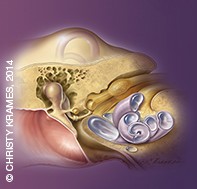Peer Reviewed
Feature Article Ear, nose and throat medicine
Ménière’s disease: a stepwise approach
Abstract
Meniere’s disease is an uncommon cause of recurrent vertigo that should be distinguished from other causes of balance disturbance such as vestibular migraine. Stepwise introduction of dietary restriction of sodium, lifestyle changes and medication can reduce the frequency and severity of attacks in most patients.
Key Points
- Meniere’s disease is characterised by recurrent attacks of vertigo, fluctuating hearing loss, tinnitus and a sensation of aural fullness.
- Attacks are sudden in onset, typically accompanied by an intense sensation of movement, nausea, vomiting, diarrhoea and sweating, and can last hours.
- Treatment options for acute attacks include ondansetron, prochlorperazine and diazepam.
- In most patients, attack frequency and severity can be reduced by a stepwise approach of dietary restriction of sodium, lifestyle changes and medication; surgical treatment is rarely required.
- Referral to a specialist is best for initial diagnosis and evaluation.
- GPs have an important role in ongoing management of patients with Meniere’s disease.
Purchase the PDF version of this article
Already a subscriber? Login here.

